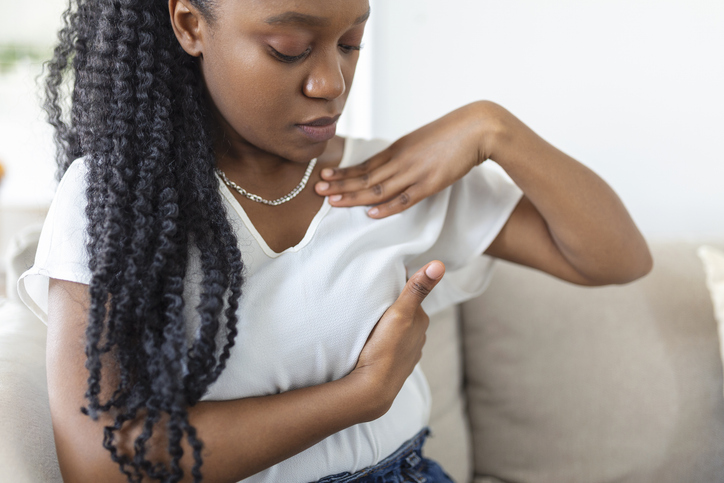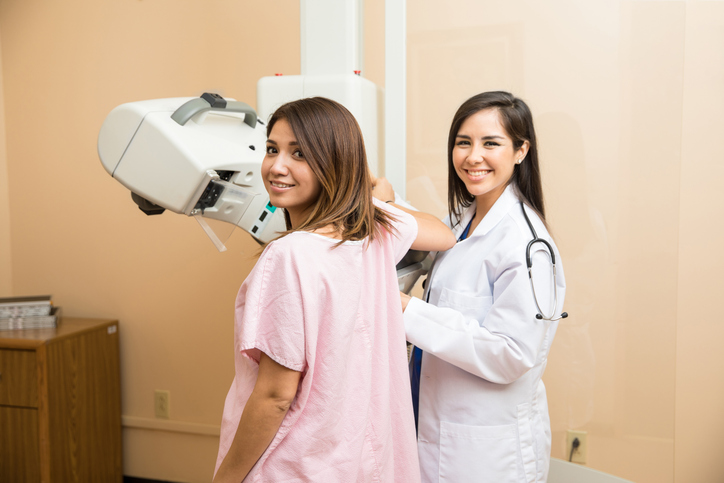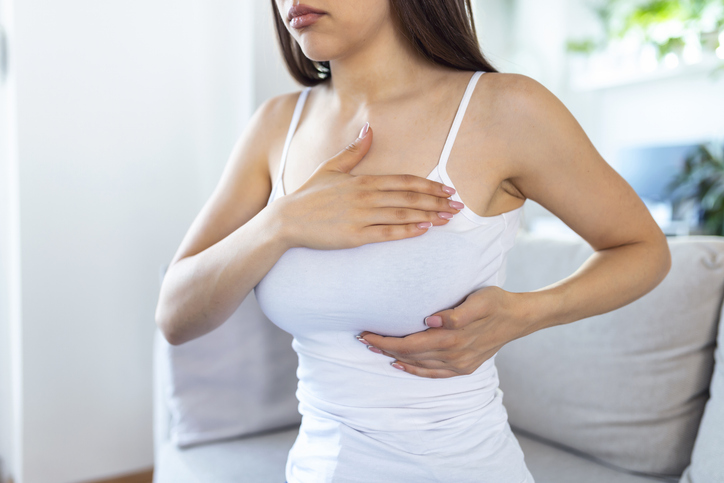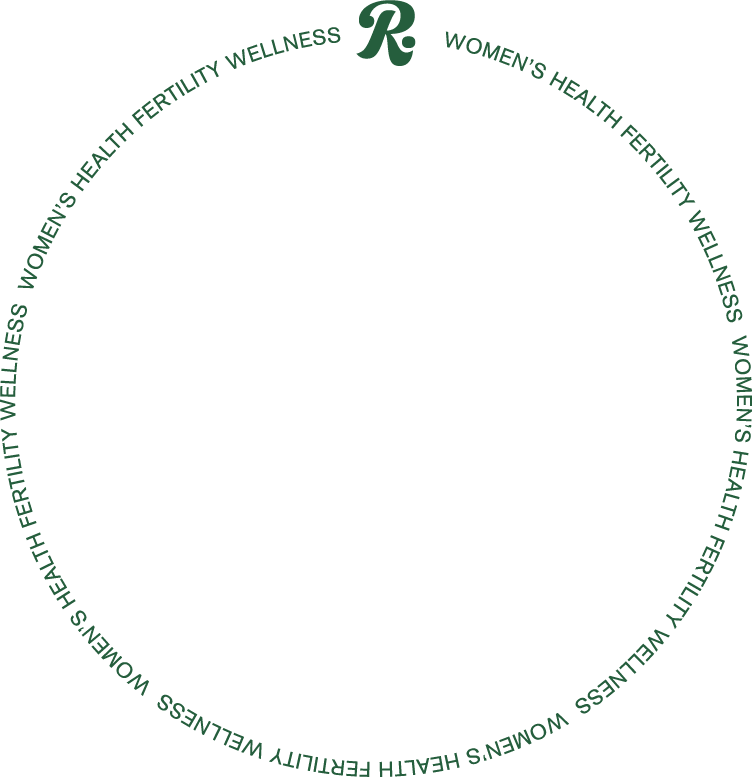Earlier this month, we learned something alarming…and something reassuring: According to the American Cancer Society’s biennial update on breast cancer statistics, incidences of breast cancer are rising, with a slightly higher increase among women under 50. This confirms what a study published earlier this year indicated. But it’s not all doom and gloom: The update on statistics also indicates that the overall death rate among breast cancer patients dropped about 44 percent from 1989 to 2022.
As we’ve all heard many times over, early detection plays such a crucial role in helping breast cancer patients survive the disease. All these findings come together to make one thing very clear: Younger women — the same demographic who may *not* be on top of their breast cancer screenings due to the long-held idea that this disease rarely affects them — need to take charge of their health by staying on top of breast cancer screenings.
The guidelines have changed, and women are encouraged to begin breast cancer screenings at 40 now, which is such an important step towards helping address the rates of young women developing breast cancer. But as we all know, it can be easy to put off these appointments, even when we know the recommendations.
Particularly for young women who don’t have obvious risk factors like family history, it can be so tempting to dismiss this news. But maybe the key to getting people to take it seriously is not just about changing the guidelines or sharing the information about young women’s breast cancer risk. Maybe it’s also about putting a face to the disease — which is exactly what some influencers and celebrities are doing.

Influencers: the new faces of breast cancer in young women
Influencer Nasreen Shahi has openly shared details of her breast cancer journey with nearly half a million followers. Shahi has taken her audience along with her through so much of her journey after her 2021 diagnosis, sharing details about her treatment, emotional state, decision to cold cap to reduce hair loss, and more. Shahi was in her early forties when she was diagnosed.
In September, influencer Bridget Bahl shared that she was diagnosed with breast cancer while undergoing an IVF retrieval with her 1.4 million Instagram followers. Bahl, who is just 41 years old, felt something in her breast and told her doctor, who ordered her to have it checked out immediately. She received a diagnosis shortly after.
Celebrities with breast cancer are wielding their influence, too
And then there’s Danielle Fishel (or, as you may remember her, Topanga on Boy Meets World). In August, Fishel revealed that she had been diagnosed with stage 0 breast cancer at age 43 — as she shared, the disease was detected“very, very, very early”. This week, Fishel delivered an update: After two lumpectomy surgeries, Fishel received news that there was no remaining evidence of disease. It’s a testament to the value of early detection: Fishel had no symptoms, no obvious lumps, no signs that anything was wrong, and if she hadn’t gone in for her annual mammogram, her treatment could have looked very different.
Olivia Munn is another celebrity who has been incredibly candid about her own experience with breast cancer in young women — and put breask cancer risk assessment tools on the map as ways women could begin to individualize their approach to screenings based on their personal risk factors.

The value of sharing these stories
The concept of digital influence is still new, and we as a society are still trying to wrap our hands around what the real impact of this burgeoning career path really is. But one thing is clear: As its best, digital influence can be lifesaving. Millennial women are at the forefront of digital influence. They’re also, in many ways, at the forefront of women’s health. A decade or so ago, these millennial women opened the doors to essential conversations about infertility, miscarriage, endometriosis, PCOS, mental health conditions, and more.
Now, as millennial women enter their forties, they’re doing the same for issues that often strike in mid-life, like menopause and breast cancer. There are countless efforts to draw awareness to breast cancer and other diseases, with the entire month of October dedicated to this cause. But somehow, real people talking about their real experiences is arguably the most powerful tool for driving awareness — at least the kind of awareness that mobilizes people to take action.
Yes, we can hear the guidelines and see the stats and read the studies, but nothing hits home quote like the image of a young, healthy woman like Shahi, Bahl, Fishel, or Munn — the type of women we assume are immune to health issues like breast cancer, and the type of women we see ourselves in — speaking out about their own experiences.
When these women open up about their experiences, they humanize these conditions, and they make us all realize that yes, these things could happen to us, and yes, we do need to take charge of that possibility.
And thanks to these women, more and more of us are
Shahi opened up about her diagnosis in a feature on Breast Cancer Research Foundation’s blog, sharing both and particulars of her experience as well as the larger impact of sharing it with her followers.
“People have told me they’ve gone and gotten their mammograms because of my posts,” Shahi said. “If sharing my journey is helping someone, I’m going to keep sharing. I want other busy moms to not take their health for granted. I would never skip my kids’ annual appointments, but I have for sure in the past skipped my own, and that’s not OK. Annual exams and self-exams will save your life.”
In her post announcing her diagnosis, Bahl alluded to this as well, writing: “i know that by sharing this i will help someone else catch it sooner and that is reason enough for me ♥️ please do your self exams.”
And while Fishel is not a career influencer, as a celebrity, she does carry a lot of influence over her fans. Undoubtedly, people who grew up alongside Fishel saw her open up about her own story and felt inspired to book that mammogram appointment.
“When I came forward with my news, friends wrote to me and said, ‘I’ve been putting (my mammogram) off for two years,' or, 'I’ve been putting mine off since the pandemic,' or, 'My mom’s been putting hers off.’ And multiple friends and friends of friends reached out to me to say, ‘Because of you, I’ve now scheduled my annual mammogram,’” Fishel told TODAY. “I don’t normally think of myself as an influencer, but in my mind, if there’s any sort of best case scenario influence I can have, it would be reminding people that preventative care makes a really big difference in your health outcomes.”

Women are the ultimate champions of women’s health
Women’s health issues have been notoriously underfunded, under researched, and over-stigmafied. That isn’t just a cultural issue, it also has very real health implications: By not giving women they information they need about their bodies, and by not seeking out answers to the questions so many women have, we’re denying them power over their own health outcomes.
But influencers and celebrities who are leading conversations (like this particular one about breast cancer and how it affects younger women, and how important it is for fellow young women to stay on top of screenings) are restoring some of that power. It has to be so difficult to open about some of the most vulnerable experiences of your life, but in doing so, these women could be saving so many other lives.
The sad reality is, as women we’ve had to become the fiercest advocates for ourselves, because there’s just not enough attention given to women’s health issues. But digital platforms have given us the power to put women’s health issues in the spotlight in the most personal and effective way. It’s sad that women have to suffer and put their pain on display in order for the world to pay attention. But these influencers and celebrities are leading the way to a world where women will have the knowledge and the tools to advocate for themselves — and that’s nothing short of heroic.
Zara Hanawalt is a freelance journalist and mom of twins. She's written for outlets like Parents, MarieClaire, Elle, Cosmopolitan, Motherly, and many others. In her (admittedly limited!) free time, she enjoys cooking, reading, trying new restaurants, and traveling with her family.




.jpg)









.webp)

.png)












